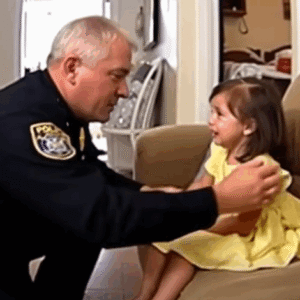It started with a simple, innocent gift — a plastic walkie-talkie handed to me by my four-year-old grandson, Max.
“Now we can talk before bed, Grandma!” he said, his little hands sticky with jam and joy. I smiled, not
realizing how much that tiny toy would change my life. I’ve always believed love was enough to earn love
back — that years of sacrifice, of doing everything for your child, would be remembered kindly. I raised my son,
Thomas, alone after my husband passed away. I scrubbed floors, washed dishes, and worked night after night
to keep food on our table. When Thomas married Lila and they bought their apartment, I even gave them
$40,000 from my retirement savings so I could live nearby and help with Max. Family, I told myself,
was worth every penny. But one night, that walkie-talkie — meant for bedtime stories — revealed a truth I never expected to hear.
It happened after a long shift at the diner. My hands were cracked from soap, my back aching, but I still smiled
when I saw the little device clipped to my apron. “Goodnight, Grandma,” Max’s soft voice whispered through the static.
But before I could reply, I heard another voice — my daughter-in-law’s. “Tom, we could rent out her spare room,”
she said, laughing quietly. “She’s barely home anyway.” My breath caught. Then came my son’s voice: “Yeah, Mom’s
too trusting. And when she gets older, we’ll find her a nice nursing home. That’ll free up space.” I froze,
clutching the walkie-talkie as if holding it tighter would make the words untrue. Their laughter echoed through
the tiny device — light, casual, heartless. Then I heard Lila again: “She thinks daycare costs $800! It’s really $500.
We’ve been pocketing the extra $300.” The air left my lungs. I’d spent my life working to make theirs easier, and they saw me as nothing more than a wallet with wrinkles.
For two nights, I couldn’t sleep. Every time I closed my eyes, their words replayed. The next morning, I looked at
my reflection — tired eyes, worn hands, but still a heart that hadn’t given up. I decided to stop letting them
take advantage of my kindness. When my 60th birthday arrived, I invited them for dinner. They came with smiles,
a cheap cake, and practiced cheer. As we sat down, I lifted my cup and said, “To family — the people we love most.”
They echoed the toast, unaware of what was coming. Calmly, I told them everything I’d heard. Every word from that night.
“The daycare isn’t $800,” I said, setting my cup down. “It’s $500. You’ve been stealing from me —
and laughing about it.” Lila’s face drained of color. Thomas tried to speak, but I continued, my voice steady.
“From this moment on, I’m done paying for lies. No more extra money. No more free babysitting. I’m opening
an account for Max, and every dollar I save will go to him directly — not through you.”
Silence filled the room. Lila fidgeted. Thomas stared at his hands. Only Max’s small voice broke the tension.
“Grandma, are you mad?” I knelt beside him, brushing his curls back gently. “No, sweetheart. Not at you.
Never at you.” He smiled and whispered, “We can still talk on the walkie-talkies, right?” I hugged him tightly.
“Every night, my love. That’s our special thing.” That night, as I sat in my quiet apartment, I realized
something profound — love should never mean losing yourself. Kindness isn’t weakness, but it needs boundaries
to stay pure. I still believe in family, but now I know: the ones who truly love you will never take advantage
of your heart — they’ll protect it. And sometimes, it takes a child’s gift to remind you what love is supposed to sound like.





